Is Soy Bad for PCOS? Read What the PCOS Experts Say
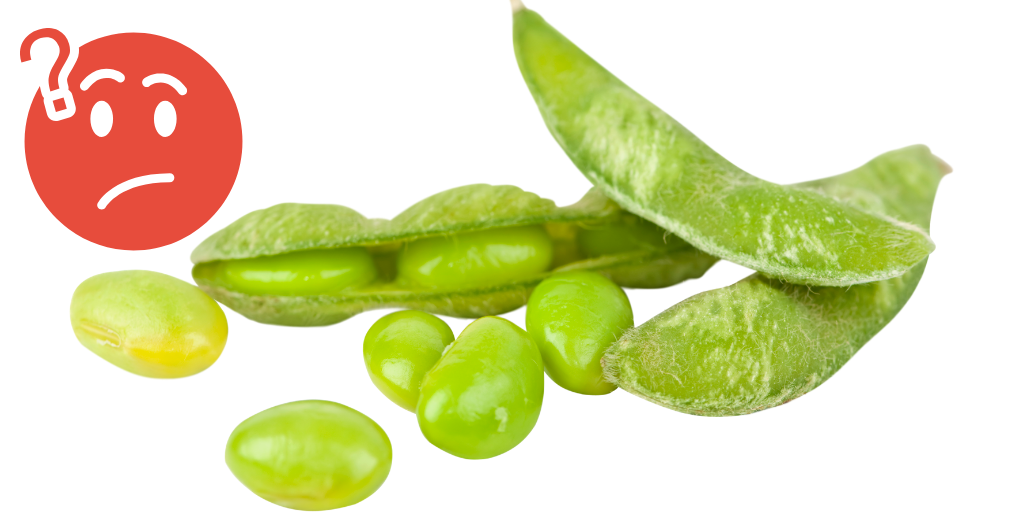
If you have PCOS, you know all too well there’s tons of information on the internet on what foods you should supposedly avoid. Soy tops the list. But where is the science? It’s confusing to say the least. Does it negatively affect hormone levels? And what about GMO’s? I decided to take a deeper dive into the research to see what I could uncover. I also hunted down 5 TOP PCOS experts to ask them this question: Is soy bad for PCOS or can it actually have health benefits? Warning: this is a long blog post!
As a nutritionist, I look for evidenced based claims when evaluating whether a food is helpful or harmful. One of my pet peeves is when various websites claim that a certain food causes harm without giving science backed data. Keep in mind that I have no agenda here. I’m not pro or against soy. My goal is to uncover science-based evidence (if there is any) that soy is harmful, helpful or just neutral when it comes to PCOS. Now keep in mind that soy is a controversial topic and this blog post is not the be all end all answer! But before I get into the PCOS expert answers, it’s important to understand that all soy is not created equal. There are different types of soy which will have varying effects in the body.
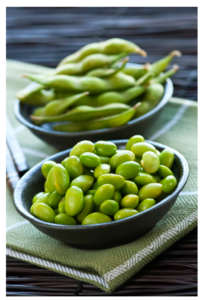 Things people say about PCOS and soy
Things people say about PCOS and soy
Here are some of the things I’ve heard and read about soy and PCOS on fb and the internet:
“Soy shuts down ovulation”
“My thyroid numbers go out of whack when I eat soy”
“Flares my cysts and gives horrible indigestion”
“Love tofu. It’s never given me any issues”
“Occasionally eat tofu/tempeh … soy milk … all organic non-GMO. My labs have never been better”
“Soy upsets my stomach”
So as you can see, soy affects women differently … and remains a confusing topic for others!
What is soy?
Soy comes from soybeans. Soybeans are a high protein food that contains all 9 essential amino acids. Therefore, it can be a good protein source for vegans and vegetarians. Aside from being high in protein, it’s also a good source of vitamin C, and folate, fiber, calcium, iron, magnesium, phosphorus, potassium, 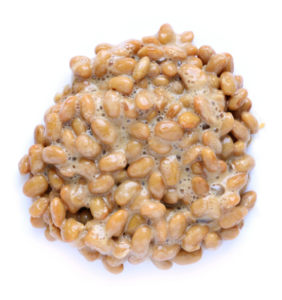 and thiamin. And it also contains phytoestrogens.
and thiamin. And it also contains phytoestrogens.
- Phytoestrogens: One of the concerns that some women have regarding soy is the fact it’s a phytoestrogen. Isoflavones are the phytoestrogens naturally occurring in soy. Some argue that because soy is a phytoestrogen it can mimic estrogen in the body, thus messing up the body’s androgen balance, having negative effects on fertility. As per Angela Grassi, RD, “Lab assays show that phytoestrogens in soy are approximately 100 to 1000-fold lower than that of estrogen. Hillary Wright, RD adds “The confusion arises from the fact that soy foods contain estrogen-like compounds called phytoestrogens. These are structurally different from human estrogen and are many times weaker so don’t affect our body’s tissues the same”.But to throw a little fuel into the fire, other research suggests the isoflavones found in soy can activate and/or inhibit estrogen receptors in the body, which can disrupt the body’s normal function. This can cause reduced estrogen activity due to the isoflavones blocking the actual, more potent estrogen from binding, or it can lead to an increased estrogen activity due to the isoflavones activating the receptors.
- What are the different types of soy? Soy beans can be eaten in a variety of ways, including natural and processed forms as well as fermentable and non-fermented. Unprocessed fermentable soy has been used as a diet staple by Asian cultures for thousands of years. However in the U.S., soy tends to be consumed in processed, non-fermentable form. It’s hidden in a lot of foods including breakfast cereals, burgers and frozen desserts. Very few of these are natural, whole-food products.
Unprocessed soy vs processed soy
All soy is not created equal. Different types of soy will have varying effects in the body. These can be broken down even more into fermented and non fermented soy.
Unprocessed soy
- Natto (fermented). Natto is a fermented food made by fermenting soybeans using bacteria called “Bacillus subtilis”. It also contains a significant amount of Vitamin K2, which is important for cardiovascular and bone health.
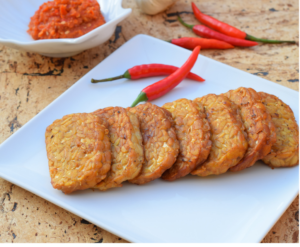 Tempeh (fermented) A protein rich food made from fermenting soybeans.
Tempeh (fermented) A protein rich food made from fermenting soybeans.- Miso (fermented) A rich, salty, fermented paste
- Soy sauce (fermented, but high sodium) Originally a by-product drained off miso, this dark brown liquid is typically used in Asian dishes. Tamari soy sauce is a by-product of miso without added grains.
- Tofu (not fermented) although some may be
- Soy nuts (not femented)
Processed soy (all are non- fermented)
- Soy milk and cheese
- Textured soy protein (TSP) is unflavored, meat or chicken flavored, and appear in chunks, slices, flakes, crumbles or bits. It’s also added to some vegetarian food products to increase the protein content.
- Soy protein isolate is also added to foods like energy bars, chips and cereals to increase the protein content.
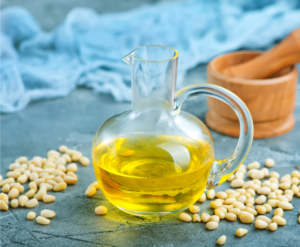 Hydrogenated soybean oil is added to many foods
Hydrogenated soybean oil is added to many foods- Meat alternative products (like fake meat)
- Soy milk
- Soy protein powders
- Soy fiber
- Isoflavone supplements
- Soy flour
Potential benefits of fermented soy
Soy that has gone through a lengthy fermentation process using bacteria or fungi contains probiotics. These gut friendly bugs (probiotics) have numerous health benefits in the body, including:
- Improved digestion.The fermentation process effectively breaks down the very high levels of phytic acid and other anti-nutrients like lectins found in unfermented soybeans thereby permitting ease of nutrient absorption during the digestive process
- Increased bioavailability of isoflavones.
- Substances in fermented soy foods have been found to alleviate the severity of hot flushes, to have a protective effect against the development of cancer,
- aid in heart health by causing a reduction in cholesterol and inhibiting the progression of atherosclerosis
- Enhance healthy intestinal flora and correct digestive tract imbalances
- Boosts the immune system
- May aid in weight loss
- Can help to lower blood pressure
- To learn about the health benefits of fermented soy, read more here
Potential health benefits & concerns of soy for women with PCOS
Since the article is already getting pretty long, I’m going to summarize the following points. Now keep in mind that the potential benefits are from unprocessed soy, not the processed kind most Americans eat. Fermented soy foods have even more health benefits, as noted above. In a nutshell:
Potential benefits
These benefits listed below and their references appears in Angela Grassi’s article Soy and PCOS: Safe or Harmful? You will note that most of the experts interviewed below mention the same potential benefits.
- Some studies show reduction in total and LDL cholesterol, whereas other studies do not
- Improved metabolic and cardiovascular health
- Reduction in insulin
- Reduction in inflammatory markers
- Reduced oxidative stress
- Reduction in testosterone
- May help decrease risk of endometrial cancer
- Positively associated with improving live births, pregnancy rates, and fertilization rates
- May protect against oxidative damage in women with PCOS
Potential downsides:
The main concerns about soy arise from 3 major issues: most soy contains GMO’s; it’s usually found in highly processed foods and it contains phytoestrogens, which may be perceived to affect hormones.
- Soy is one of the biggest crops in North America and it’s estimated that over 90% is genetically modified (contains GMO’s). As per Dr. Fiona McCoullough (see more below), soy is typically contaminated with significant levels of pesticides such as glyphosate: a known endocrine disruptor. In fact, most soy is genetically modified to resist herbicides, so that the crop can be sprayed with them. This is definitely a concern for women with PCOS.
- In addition, soy is generally consumed in a processed form (i.e. soy milk, hydrogenated soybean oil) and is often added to processed foods.
- Large amounts of soy may affect thyroid function
- Soy contains anti-nutrients including lectins, phytates, and oxalates. Fermentation of soy decreases this.
- One study , not specifically done with PCOS, suggested that consuming soy protein in excess (>100 mg soy isoflavones/d) can lead to reduced ovarian function. However this same study stated lower levels of soy, e.g. 1–2 servings of soy/day, as part of a well-balanced diet should not pose harmful effects on the function of the ovary as it relates to ovulation. But note that the majority of studies show the opposite – that soy improves fertility.
- While not about PCOS, there is evidence that soy-based infant formula can cause harm to infants, both via its isoflavone content and its unnaturally high content of manganese and aluminum.
Is soy bad for PCOS? What the experts say
So moving onto the title of my blog post!I asked the 5 medical experts who specialize in PCOS: 3 registered dietitians and 2 physicians. Drum roll … So here is what they had to say:
Felice Gersh, MD
Soy is an excellent food for women with PCOS, with a few key caveats. First, the soy must be unprocessed and organic. Most soy sold in the US is GMO and much is heavily processed. Never eat soy  mimicking something else – like cheese, turkey, or ice cream. And please don’t eat soy hot dogs!
mimicking something else – like cheese, turkey, or ice cream. And please don’t eat soy hot dogs!
Unprocessed soy includes tofu, edamame, miso, and fermented whole soy. And you have so many ways to use such soy foods! Of course, soups and stir fries are fantastic!
“Real soy” is so good for PCOS women because it is a phytoestrogen. That means it can bind to certain estrogen receptors and create something of the effect of real estrogen. Soy is similar in effect to estrogen receptor Beta, the dominant estrogen receptor found in the gut lining cells. Estrogen is extremely healing to the gut, promoting growth of the proper microbes and helping to maintain a healthy gut lining – one with an intact lining called gut integrity. When damaged and the gut integrity is impaired, the result is a “leaky gut,” which allows toxins formed within the gut to escape into the body proper. Women with PCOS will most likely have an impaired gut barrier (leaky gut) due to diet, toxins in foods, stress and anxiety, and poor estrogen production and function. Soy can help to improve the health of the gut!
It’s possible that soy can help in even more diverse ways. By attaching to estrogen receptors, a whole host of benefits can be possible, ranging from weight loss to improved mental health.
Sadly not all women with PCOS will benefit from soy, or not as much as would be hoped. The reason is that to exert its beneficial estrogenic effects, the soy must be metabolized first to another product and this requires specific gut bacteria which have the capability to metabolize soy into its active phytoestrogen component. Sadly, up to half are lacking the proper microbial components to make this happen. Even so, the soy when eaten organic and unprocessed will not create harm.
What I recommend is to first do a proper elimination diet, which includes removing soy and many other foods from the diet. The reason is that some have allergies to soy. Once eliminated, it’s added back to see if there are any adverse reactions. Assuming none, I recommend including organic unprocessed soy in the diet. Eat a serving several times a week and see how your body responds. Of course, eat lots of vegetables and fiber to nourish the microbiome of the gut and work to restore its health. With luck, you’ll soon see significant beneficial health results!
Martha’s question: I’ve been reading about “PCOS and estrogen dominance” in various places on the internet. What do you have to say about soy and estrogen?
Bio:
Felice L. Gersh, M.D. is a rare combination of an award winning physician, Board Certified both in OB/GYN and in Integrative Medicine. Her educational background includes an undergraduate degree from Princeton University, a medical degree from the University of Southern California School of Medicine, and a 2 year Fellowship in Integrative Medicine at the University of Arizona School of Medicine.
Dr. Gersh has dedicated her career to women, focusing on the aspects of women’s health which are unique, under-appreciated, and poorly managed. She is the Medical Director of the innovative Integrative Medical Group of Irvine, leading her team of skilled holistic practitioners.
Dr. Gersh is a sought-after national and international speaker, a published writer of book chapters and a prolific blogger. She has been featured on numerous web summits, podcasts, and radio shows, and has her own segment, A Healthy Perspective, heard weekly on Los Angeles AM radio, KRLA 870. Her first book, on PCOS, will be available late 2018
Fiona McCullogh, ND
Soy is one of the biggest crops consumed in North America and is often added to processed foods. Unfortunately, it is also typically contaminated with significant levels of pesticides such as glyphosate: a known endocrine disruptor. In fact, most soy is genetically modified to resist herbicides, so that the crop can be sprayed with them.
 Since women with PCOS are much more sensitive to the negative impact of endocrine disruptors on their hormones and metabolic health, it makes sense to avoid processed soy products and genetically modified soy.
Since women with PCOS are much more sensitive to the negative impact of endocrine disruptors on their hormones and metabolic health, it makes sense to avoid processed soy products and genetically modified soy.
It has also been found that consuming extremely large amounts of soy can cause endocrine disruption, so it is best not to overdo it with quantity or frequency. On the other hand, many populations who consume soy, in particular, fermented soy do have lower risks of chronic disease so more research is needed before we have a solid conclusion.
Given our current knowledge, the bottom line is:
1)Avoid processed and GM soy
2) Avoid consuming large amounts of soy
3) If soy is to be consumed occasionally choose unprocessed, organic and non-GM to minimize any negative impact.
Bio
Dr. Fiona McCulloch is a Naturopathic Medical Doctor and founder of White Lotus Integrative Medicine in Toronto Canada, an urban wellness clinic serving thousands of women with hormonal conditions since 2001.
Dr. Fiona’s book 8 Steps To Reverse Your PCOS offers her well-researched methods for the natural treatment of Polycystic Ovary Syndrome.
Fiona is also a medical advisor to and developed the nutrition methodology for the OpenSourceHealth PCOS project which analyzes molecular, genetic, metabolic and hormonal markers in women with PCOS. As a woman with PCOS herself, Dr. Fiona feels fortunate to serve as a guide, providing trusted information that empowers women to manage their own health.
 Angela Grassi, RD, MS
Angela Grassi, RD, MS
Women with PCOS have enough things to worry about. Soy doesn’t need to be one of them. The research shows that moderate soy is actually beneficial for women with PCOS with several caveats.
Consuming moderate amounts (a few servings a week) of traditionally prepared, unprocessed soy in non-GMO form may offer health benefits to women with PCOS who do not have thyroid disorders. These benefits include reductions in LDL cholesterol and triglycerides and possible reductions in insulin resistance. Soy may also provide protection against oxidative damage in women with PCOS.
Women with PCOS who are trying to conceive may find that moderate intakes of soy could improve their fertility.
Those with thyroid disorders may want to be cautious with their intake of soy, avoiding high amounts, but do not need to fear it. Having a diet with sufficient amounts of iodine and regular monitoring of thyroid tests is recommended.
Read some of Angela’s articles on soy and PCOS:
Health benefits of soy for PCOS
Soy and PCOS: Safe or Harmful?
Bio
Angela is an internationally recognized nutrition and health expert on PCOS. She was recently named one of the Top 10 incredible RDs making a difference by Today’s Dietitian. She is the author of The Dietitian’s Guide to Polycystic Ovary Syndrome, The PCOS Workbook and The PCOS Nutrition Center Cookbook. Angela is the owner of PCOS Nutrition Center where she provides nutrition counseling to women with polycystic ovary syndrome. Having PCOS herself, Angela is dedicated to advocacy, education and research of PCOS.
An accomplished speaker, Angela is a frequent lecturer at numerous conferences and meetings for professionals and consumers, including: PCOS symposiums, the Academy of Nutrition and Dietetic’s Food, Nutrition, Conference and Expo, state and national dietetic association conferences and provides national training programs for dietitians working with individuals with eating disorders and PCOS.
Angela was given the distinguished Ricardo Azziz PCOS Challenge Advocacy Leadership Award for her dedication to advocacy and public policy efforts that expand access to resources and support for women with PCOS.
Hillary Wright, MS, RDN, LDN
As a nutritionist who works both with women with PCOS and breast cancer – two hormone-sensitive conditions – I am asked about soy a lot. In both situations, the science suggest soy is a healthful addition to the diet, particularly as a substitute for red meat. The confusion arises from the fact that soy foods contain estrogen-like compounds called phytoestrogens. These are structurally different from  human estrogen and are many times weaker so don’t affect our body’s tissues the same.
human estrogen and are many times weaker so don’t affect our body’s tissues the same.
In women with PCOS, soy foods have been linked to healthier cholesterol profiles and hormone levels, as well as improvements in insulin resistance, a condition responsible for many of the damaging health effects seen in women with PCOS. Soy intake has also been associated with better IVF outcomes in women with PCOS. It’s important to note the recommendation is to include whole soy foods in the diet, like tofu, tempeh, miso, edamame and soy milk, not pill, powders or bars, as we don’t know whether these processed, concentrated forms of soy might behave differently in the body.
Bio
Hillary Wright is the Director of Nutrition for the Domar Center for Mind Body Health at Boston IVF in Boston, Massachusetts, and the author of The PCOS Diet Plan: A Natural Approach to Health for Women with Polycystic Ovary Syndrome. She also holds a part-time position as a Senior Nutritionist at the Dana Farber Cancer Institute in Boston, MA.
Judy Simon, MS, RDN, CD, CHES, FAND
Soy is a safe and beneficial food for women with PCOS. In fact I encourage my patients to include tofu, tempeh and edamame into their diets. Research supports that soy isoflavones improve insulin resistance, triglycerides, oxidative stress, weight and reduction in androgens. Recent studies have also found improved outcomes with women undergoing fertility treatments.
Bio:
Judy Simon MS, RDN, CD, CHES, FAND specializes in nutrition counseling for individuals, couples and families. Judy provides evidence-based nutrition counseling in eating disorders, reproductive nutrition (fertility), and weight management. She is recognized nationally as an expert of nutrition and fertility. She is also a Clinical Instructor at University Washington.
Judy offers her clients the unique experience of a non-dieting, intuitive approach to healthy eating. Many of her clients have tried traditional diets and programs and failed. Instead, Judy combines her expertise in nutrition and coaches her clients to success to lose weight, overcome eating disorders and master self-management of their health.
Judy’s professional contributions garner national attention from the nutrition and fertility fields. The Academy of Nutrition and Dietetics awarded Judy the Excellence in Practice in Women’s Health in 2014 and the Community Practice Award for Excellence, Washington Academy Nutrition Dietetics 2017. Additionally, in coordination with Dr. Angela Thyer, Judy developed the Food for Fertility Program (TM) in 2011. Judy presented the outcomes of the Food for Fertility program at the American Society Reproductive Medicine (2013) and the Pacific Coast Reproductive Society Annual Scientific Meeting (2015).
Judy served as the President of the Seattle Tacoma Reproductive Society (2014-2015), past-chair of the Nutrition sub-interest group of the American Society of Reproductive Medicine and continues on as mentor coordinator of the Women’s Health Dietetic Practice Group. She is also a board member for the Diabulimia Helpline.
Bottom line
Soy is a complicated and hot button topic. I believe that health experts will continue to disagree about soy. I am not here to persuade you to eat soy! But I wanted to provide evidenced based info as well as the opinions of PCOS experts to help you make your own decision. The take home point here is that all soy is not created equal. So we really can’t lump all soy into one category. Is soy bad for PCOS? YES – some types are! But can other types of soy be healthy? YES! But obviously if you feel your symptoms worsen after eating soy or experience other ill effects, avoid it at all costs.
Here are my recommendations:
- If you have a soy allergy (soy is a common allergen), sensitivity, don’t like soy or feel it worsens symptoms, DON’T EAT IT!
- If you want to include soy in your diet, it is likely a good idea to test for a soy sensitivity. Omit it from your diet 100% for about 3 weeks. Then do a test of adding it back in (ideally in an non-GMO unprocessed form) and see how you feel.
- The BEST choices for soy are non-GMO, unprocessed, fermented (include tempeh, miso, natto, and soy sauce) Also keep in mind miso and soy sauce are high in sodium
- The NEXT BEST choices are non-GMO, unprocessed soy like tofu, edemame and soy nuts.
- AVOID (or at least strictly limit) processed soy found in many foods like energy bars, cereals and veggie burgers. Read food labels for soybean oil, textured soy protein, soy protein isolate.
- Those with thyroid disorders may want to be cautious with their intake of soy and keep portions moderate. Having a diet with sufficient amounts of iodine and regular monitoring of thyroid tests is recommended.
- If you experience gastro-intestinal issues (bloating, gas, diarrhea or constipation) from eating soy products like soy milk or products with added soy protein, it may due the fermentable carbohydrates found in some soy foods called FODMAPs. Soy is a frequent culprit for people who have IBS. Moderate portions of edemame or firm tofu may be tolerated. If not, omit it.
- If you choose to include soy in your diet, consume it in moderation. More is not better 🙂 A few servings a week or one serving a day of unprocessed soy might be a good limit. It is unknown if consuming large amounts of soy can act as endocrine disruptors.Do you eat soy? If so, what types? Have you noticed any positive or negative effects when eating soy?
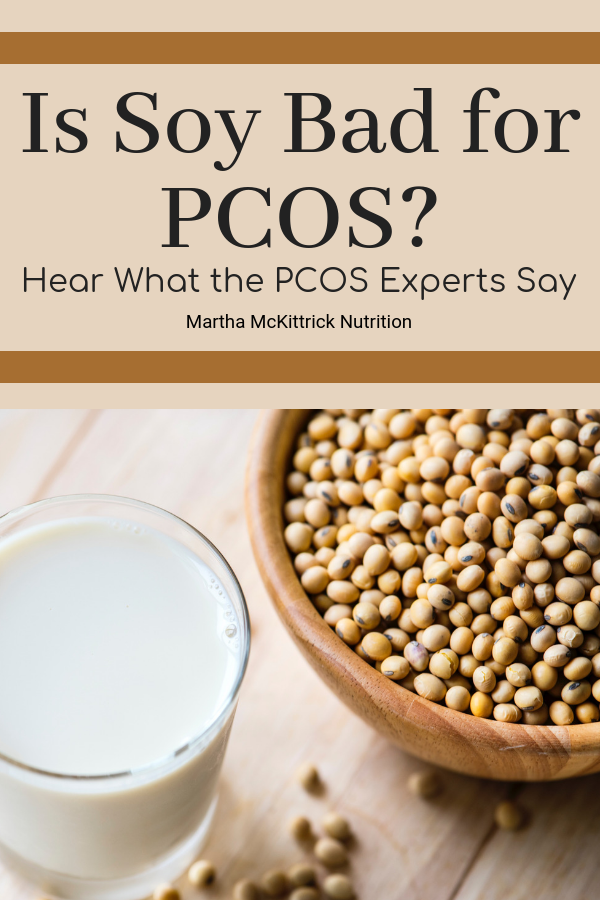
RELATED POSTS
MEET MARTHA
I especially love problem-solving, whether it’s helping women defeat issues plaguing them for years, helping a busy executive find practical ways to get heart healthy, or providing tips to help you reverse diabetes. That’s why I’m on a constant quest to expand my knowledge by staying on top of the latest research.
1 Comments
Leave a Comment
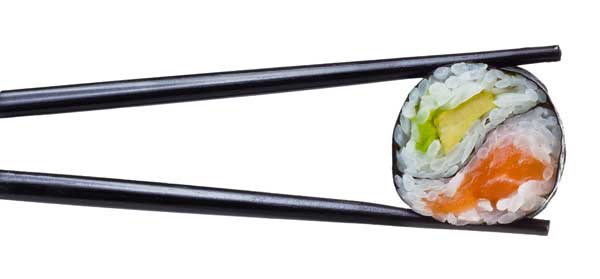
20 Ways To Eat Out 550 Calories or Less!
No time to cook? We’ve got you covered. Here are 20 healthy meals from a variety of cuisines that won’t pack on the pounds. Most of them also have less than 30 grams of carbs.
Subscribe to my newsletter and get this free download.
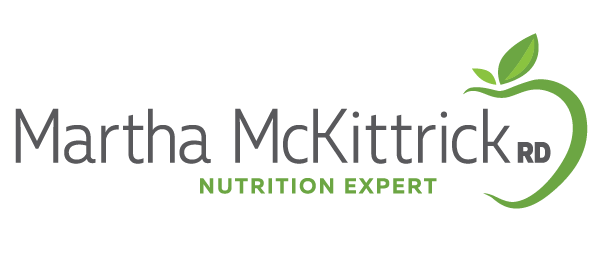


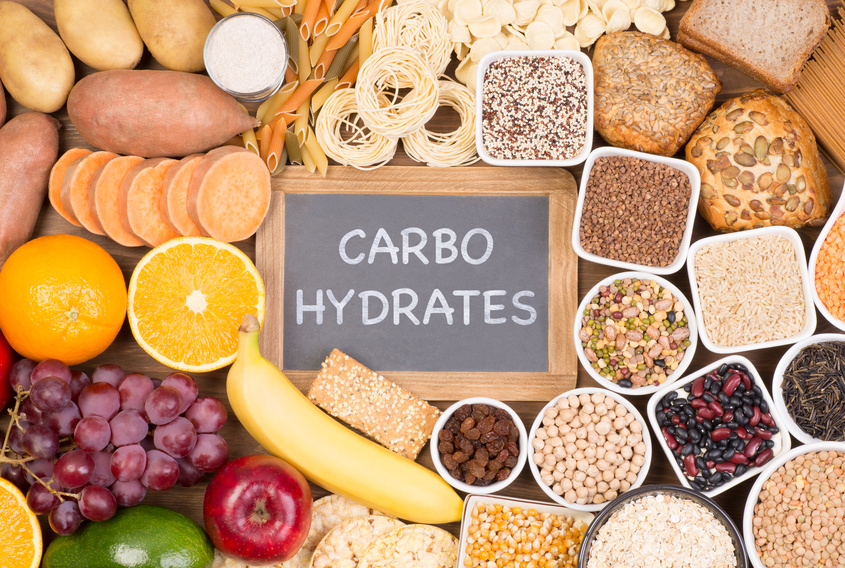
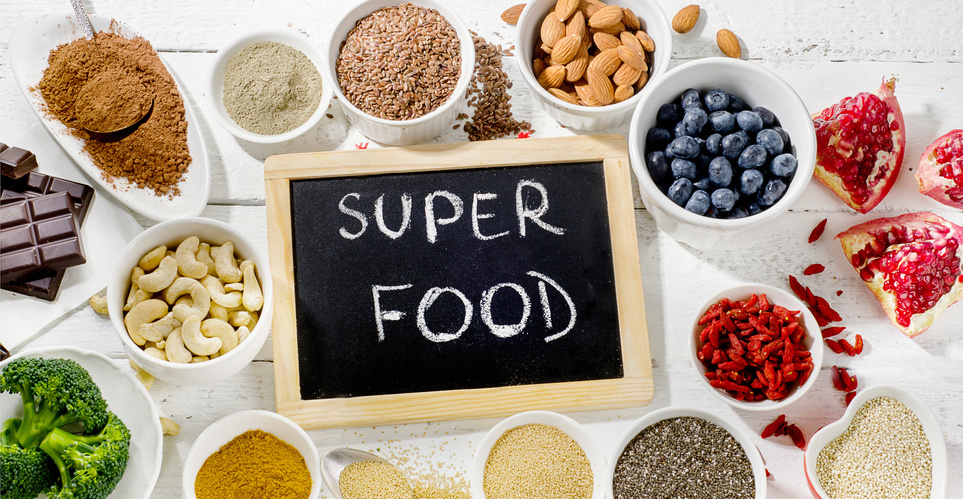

what about soy yoghurt?